
Trouble comes in threes and Finance Minister Nirmala Sitharaman knows it all too well. Just hours after she assumed charge on May 31, GDP growth plunged to a 5-year-low.
Weeks later, expectations were high that her maiden Budget would be extraordinary, if not historic. It stood out alright, but for all the wrong reasons.
The enhanced super-rich surcharge irked investors, forcing the Centre to roll back and forego Rs 1,400 crore revenue, which is chump change of the total direct tax collections of Rs 13.35 lakh crore. But why the government remained deadbeat until investors flashed the 'forget you in 2024' sign is unfathomable.
More misfortune befell in the following weeks from multiple quarters. The FM's gag order on media frustrated the fourth estate, which refused to break bread during the customary post-budget dinner meeting. The Editors Guild sent a missive expressing displeasure, but that changed little.
Corporates and common folk complained of rampant tax terrorism, while bankers sat tight on credit fearing calls from investigators. MSMEs felt betrayed amid delayed GST refunds and liquidity crisis, while government departments emerged as the biggest defaulter for non-payment of dues to industry.
In short, there was something for everyone to be upset about, though none had a clue what edge the government gained throwing everyone off-balance.
Clearly, Sitharaman's first stint at the finance ministry was anything but pleasant and given the mounting public frustration, something needed to be done. And now.
First, a trusted aide of her predecessor Arun Jaitley -- former finance secretary Subhash Chandra Garg, whose bureaucratic wheeze on the RBI shattered peace and credibility -- was drummed out of office. News also made its way that the FM was ill-informed on some issues, and critics pounced on it pointing out that the finance ministry wasn't a place for on-the-job-learning.
More trouble was in store as markets, manufacturing and mining creaked while dipping sales of bikes and biscuits further soured the slowdown sentiment.
By now, it was clear the government equally depended on the economy and that the 'roof needs fixing while the sun's shining.'
That's when Sitharaman started unlocking her goodies box. First came 32 relief measures to prop up consumption and confidence. Faceless assessment and transparency were initiated to reduce harassment, while tax sleuths will deal with grievances on social media -- a leaf taken out of Sushma Swaraj's playbook. All income tax notices will be done and dusted by October, while GST refunds will come in 60 days flat. Importantly, pending dues will be cleared, while FDI is eased in specific sectors -- all indicating that the Centre will listen and course-correct.
Next came the big bank mergers, which tactically coincided to offset the dismal GDP data released on Friday. That's not all. A final lot of her three-part weekly-goodies show will come next week aimed at real estate consumers and others.
Despite all the flip-flops, none can deny that Sitharaman is tenacious and even if you give an A for her efforts, there are miles to go to get the coveted triple-A.
Her oratory skills have come in handy-- both media briefings had hour-long presentations -- showing her confidence, if not complete command. Yet, she refrained from answering a few media queries, encouraging her deputies to respond. A signal perhaps of her growing dislike of the media. Bad news does take its toll.
While Sitharaman's policy moves will take time to affect economic statistics, she also has a magic bullet in her armoury -- reforming the direct tax code.
The Akhilesh Ranjan committee recommended tweaking personal income tax slabs and it's likely that Sitharaman will accept them mid-term to lure the middle-class, just in time for the next elections. By then, if all goes well, our finances should stabilize and the economy should be strong enough to take the tax cuts. In the meantime, she can unleash measures such as disposing of distressed assets like Air India and BSNL.
To sum up, as a country, we have been lurching towards a disaster in the past three months. As luck wouldn't have it, on the FM's 100th day came the biggest setback, with GDP growth crashing to a seven-year-low. On July 5, Sitharaman held forth the promise of an Indian Dream and a $5-trillion economy, both of which are now in doubt.
The trouble was that Jaitley didn't actually hand over his sishya an economy gift-wrapped with a bow. But look at it another way, it's an opportunity for Sitharaman to prove her mettle. If and when she actually steers the economy out of the rut, Sitharaman would have paid a fitting and priceless guru dakshina Jaitley and the country wanted.


.jpeg)

